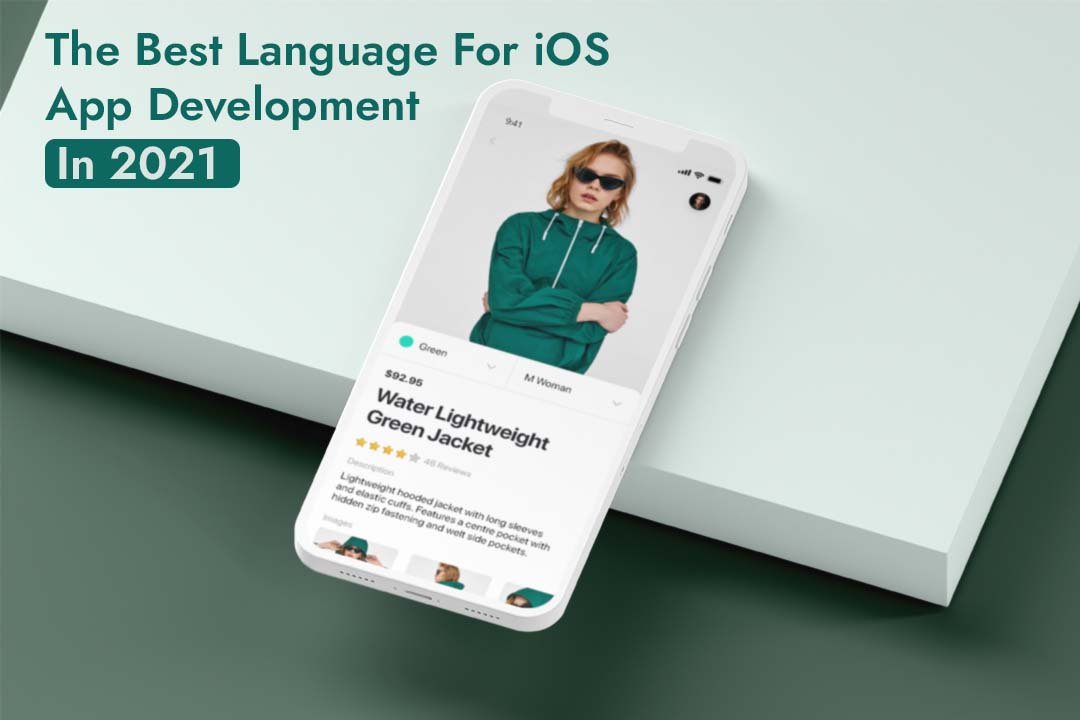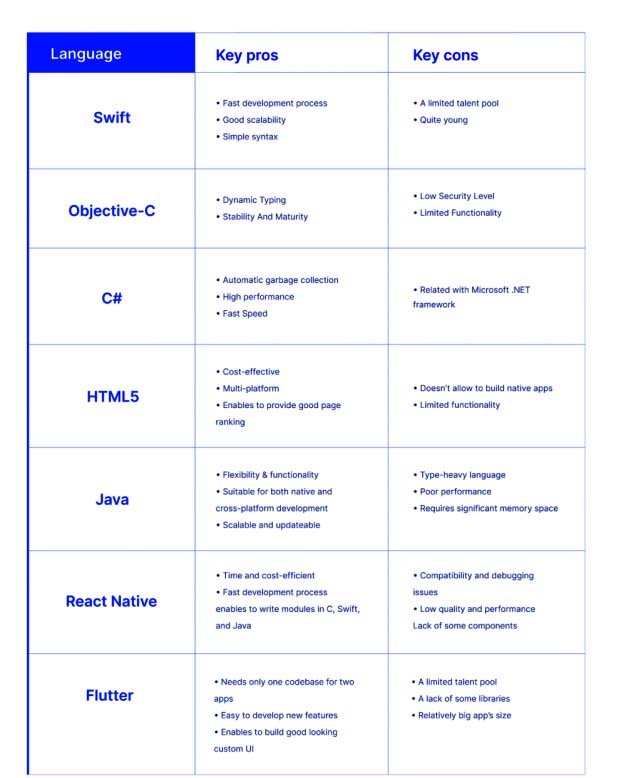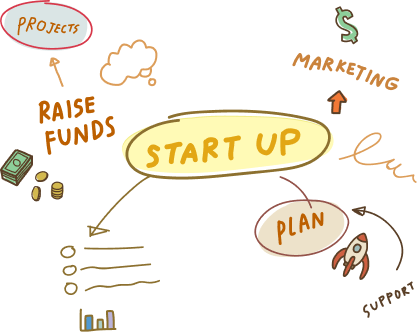1 Oct, 2022 | Mobile App Development
Picking The Best Language To Expedite iOS App Development

 This should not come as a surprise that in Aug 2021, 56.94% of online relations were made through the help of mobile devices, as it is indicated by StatCounter data. These days, people are more dependent on mobile phones than any other device.
This should not come as a surprise that in Aug 2021, 56.94% of online relations were made through the help of mobile devices, as it is indicated by StatCounter data. These days, people are more dependent on mobile phones than any other device.
Things to Remember before working on iOS application development:
Developing an application can be a tedious task. We have created a handy list to avoid any mistakes and ensure that the development is fruitful for you and the audience. You must check the list given below, before you hop onto the development process. 1. Clarify the main purpose: You must be clear of the reason why you wish to develop and publish the app. The application that you're working on should serve a purpose, and you ought to be aware of the same. These simple questions might help you get a clear vision:
Why does this app need to be built?
Who will all benefit from this app?
Is there any other app with the same background purpose? If so, what can I change about my app to make it unique? Answering these simple to look at yet tricky questions will get you ahead on the journey. In addition, you will get a clearer picture of the purpose of your work.
2. Market research is necessary: Before diving into the whole process of developing an app, you must consider taking a tour of the current market. A well-researched and well-known developer is way better for your app development venture. Skills are one part of the development, while researching is another portion that must not be missed. It gives a better perspective and makes you aware of the recent trends, the needs of the targeted audience, and many more aspects of iPad application development. Even being one of the critical steps, many entrepreneurs often miss out, and they pay for it later. This further would lead to the great success of your iOS app.
3. Detailed planning of the app development: Once you get done with the first two significant steps, the following very obvious step is to plan every detail of your application. Go for the best iOS app development services to get this work done. Ensure that the company you're hiring for the project is well-versed and has experience in the field. Ask the iOS app development services to map out a detailed plan of the project in front of you. Make sure you explain the requisites and your purpose to the team.
All the goals of the application development must be considered while planning out the app formulation procedure. Try making the following question while on this stage:
1. Clarify the main purpose: You must be clear of the reason why you wish to develop and publish the app. The application that you're working on should serve a purpose, and you ought to be aware of the same. These simple questions might help you get a clear vision:
Why does this app need to be built?
Who will all benefit from this app?
Is there any other app with the same background purpose? If so, what can I change about my app to make it unique? Answering these simple to look at yet tricky questions will get you ahead on the journey. In addition, you will get a clearer picture of the purpose of your work.
2. Market research is necessary: Before diving into the whole process of developing an app, you must consider taking a tour of the current market. A well-researched and well-known developer is way better for your app development venture. Skills are one part of the development, while researching is another portion that must not be missed. It gives a better perspective and makes you aware of the recent trends, the needs of the targeted audience, and many more aspects of iPad application development. Even being one of the critical steps, many entrepreneurs often miss out, and they pay for it later. This further would lead to the great success of your iOS app.
3. Detailed planning of the app development: Once you get done with the first two significant steps, the following very obvious step is to plan every detail of your application. Go for the best iOS app development services to get this work done. Ensure that the company you're hiring for the project is well-versed and has experience in the field. Ask the iOS app development services to map out a detailed plan of the project in front of you. Make sure you explain the requisites and your purpose to the team.
All the goals of the application development must be considered while planning out the app formulation procedure. Try making the following question while on this stage:
- What technology is apt for the development procedure?
- What frameworks should be used?
- Which language should the app be built on?
- How to measure the success of the app?
- Will the chosen requisites serve the iPad application development well?
- How would you secure the app?
- Do you wish to make other versions for the different operating systems as well? If yes, how will you plan out the development process?
- What are the goals of the development?
Top Language for iOS App development:
Coming to the best language for mobile app development 2021, we list the top chosen languages. We have curated this list only after meticulous research while considering many aspects of iOS application development. Remember, while choosing a language for your application development procedure, you should have the farsightedness to grab the best opportunity. You might have to alter a thing or two in the future. Keeping that in mind, choose a flexible language and can work for multiple devices if you somehow choose to change the specifications. Read also: iOS App Development Tools and Remarkable Apple Store Apps To help around this crucial decision, we have listed several programming languages you can choose from for iPad application development.- Swift: Be it macOS, iOS, watchOS, iPad, or apple tv, Swift is there to serve all these devices in one go. You can develop an app on Swift for multiple devices without any hassle. Originated in 2014, Swift has become the face of the most preferred choice for iOS development over time. Swift was previously aimed to work with Cocoa, Cocoa Touch, and a substantial codebase written in Objective-C. As the stats at Stack Overflow 2020 Developer Survey indicate, Swift is among the top 17 famous programming languages around the globe. Another interesting fact states that Swift is used by 5.9% of developers worldwide. Swift can come in handy for those who wish to create an application built real quick and can be expanded later on without much hassle. Being relatively easier to learn, the language offers a quick development of an application for iOS devices. Furthermore, the language is frequently updated, so you can easily improvise the features from time to time.
- Objective-C: This one was created as an extension of the C language, previously very popular. The objective term comes from its capabilities of object-oriented programming. Created in early 1980 by Tom Love and Brad Cox, this language found its origin in the company named Stepstone (previously called PPI- Productivity Products International). A general-purpose language as it is, objective C is used to develop iOS and their APIs- Cocoa and Cocoa Touch. Objective C has scored a rank of 20th among the most popular programming languages index. After Swift, this is probably the best choice for iOS developers.
- C#: Adding adjectives like high level, general-purpose, and object-oriented would be very fair for C# language. It is integrated closely with .NET which serves as a framework as well as the runtime environment. Most commonly, C# is used for developing windows systems. One can easily develop native software in the C# language for any platform, even iOS. C # is the 7th most popular open-source programming language developed by Microsoft. There are 5 to 8 million C# and .NET developers worldwide. Thus, if you wish to develop an application that could run for both iOS and Android, C# has got to be your best choice.
- HTML 5: By finely defining the content and structure of the application, HTML 5 is the newest version of HTML. Often paired up with CSS and JavaScript, HTML and the combination turns out to be the best among all the languages. So, if you wish to quickly get a hands-on, simple iOS application that works offline, go for HTML5.
- Java: Another excellent alternative for iOS development would be Java. Class-based, object-oriented, general-purpose are also its features. What is significant about this language is that it can be run on any platform without taking the hassle of recompilation. It is used by over 9 million developers worldwide. The best thing about Java is that it is flexible and can be used for cross-platform developments.Read more about New Trends In Mobile App Development

Takeaway:
With most languages being highly functional and lucrative, we have presented scope for comparison among the top languages. Therefore, you may follow the instructions carefully and choose wisely for your next iOS application development. Schedule a free consultation with us to choose the best solution for you.Frequently Asked Questions
Some popular programming languages used for iOS app development include Swift, Objective-C, and C++.
Swift is a modern programming language developed by Apple specifically for iOS, macOS, watchOS, and tvOS app development. It offers a simpler and more intuitive syntax compared to Objective-C, making it easier to learn and use. Swift also provides faster performance and safer code compared to Objective-C, making it a good choice for iOS app development.
Objective-C is an object-oriented programming language that has been used for iOS app development since the release of the first iPhone. It provides a rich set of features for developing iOS apps, and many legacy iOS apps are still built using Objective-C. Objective-C is also used for developing macOS and watchOS apps.
C++ is a general-purpose programming language that is often used for developing cross-platform apps. It provides high performance and low-level access to hardware, making it a good choice for developing performance-intensive iOS apps. C++ is also used for developing games for iOS devices.
Yes, it is possible to use multiple programming languages for iOS app development. For example, you can use Swift for the app's user interface and business logic, Objective-C for integrating legacy code, and C++ for developing performance-intensive features. However, using multiple programming languages can make the code more complex and harder to maintain.

